Free Papua: how the Papuans are trying to save their world and win independence
When the word "Papuan" in the average man in the street there are associations with savages living in the Stone Age and industrial cannibalism. What to conceal - such tribes, characterized by extremely low levels of development, exist in the wooded and mountainous areas of the island of New Guinea and at the present time. But still - there is an independent state of Papua - New Guinea, occupying the eastern part of the island of New Guinea and a number of adjacent islands (Northern Solomon Islands, Bismarck Archipelago, D-Antrasto Islands). The southeastern part of the island from 1884 was under the control of the British Empire, it was later transferred to Australia. Northeast before the defeat of Germany in the First World War was a German colony, and in 1920, it also fell under the control of Australia. In 1975, the eastern part of the island and the adjacent islands became the independent state of Papua New Guinea. Today this state functions, relying on the considerable assistance of Australia - yesterday’s metropolis, which continues to “take care of” its former colony.
West Irian
As for the western part of the island of New Guinea, its history has developed much more dramatically. Until 1949, the western part of New Guinea was part of the Dutch East Indies colony. After the Netherlands officially recognized the political sovereignty of Indonesia in 1949, under the bilateral agreements, all power in the territory of the former Dutch East Indies, with the exception of West Irian, passed to the Indonesian republican government. The latter was decided to leave the Netherlands under control until the final settlement of the issue of the further fate of this province.
At 1950 in the negotiations between the Netherlands and Indonesia, the Dutch delegation rejected the proposal of the Indonesian government to bring Western Irian under control of Indonesia. In February 1952, the government of the Netherlands made an amendment to the country's Constitution, providing for giving West Irian the status of part of the Kingdom of the Netherlands. The desire of the Dutch authorities to maintain political power over the remote province of the former Dutch East Indies was due to economic reasons - West Irian is a real treasure of forests and minerals. Despite the decision of the Dutch government, Indonesia did not abandon hope for the accession of West Irian to its territory. In January, 1955, a radical Indonesian youth in Central Java, announced the creation of the West Irian Liberation Army headquartered in Semarang. By May 1955, thousands of volunteers joined the ranks of the army. Young Indonesians have declared their readiness to speak at any time. weapons in the hands against the Dutch colonialists, for the return of Indonesia to the province of West Irian.
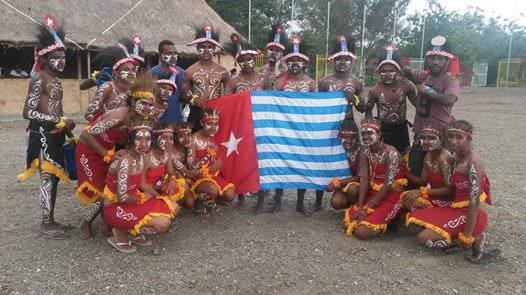
The country's leadership headed for the liberation of Western New Guinea from the Dutch colonialists, which was implemented in 1961-1962. as a result of the Indonesian-Dutch armed confrontation. The Indonesian leadership brought armed forces into the province, at the same time, with the help of trade unions, Indonesian workers employed in Dutch enterprises in West Irian, went on strike. Also, the Indonesian authorities announced the nationalization of Dutch enterprises and the deportation of Dutch citizens from the country. 15 August 1962 The Netherlands was forced to sign an agreement in New York to transfer West Irian under the management of the United Nations Transitional Executive Authority. Meanwhile, even 19 of October 1961, the Papua Peoples ’Congress, which gathered about forty tribal leaders, decided to raise the flag of Papua along with the flag of the Netherlands and sing the Papua anthem of the Netherlands from 1 in November 1961. 21 September The 1962 of the United Nations General Assembly decided to move from 1 in May 1963 of the West Irian province to Indonesia. The former Dutch colony of Western New Guinea was named "West Irian" (in 1969-1973), then the province "Irian Jaya" (1973-2002). In 2002-2005 Indonesian authorities have decided to divide the territory into two separate provinces - Papua and West Papua.
Initially, West Irian remained the most socially, economically and culturally backward region of Indonesia. Despite the fact that Indonesia is a fairly densely populated country, with a population of 253,5 million, West Irian remains a sparsely populated area. Most of the inhabitants live in the countryside, in the villages. Huge spaces of land in the inner part of the island are not inhabited and are not actually used due to the lack of normal roads and inaccessibility. In the largest city of Jayapura is a local university. Most of the population of West Irian, unlike the rest of Indonesia, belongs to the Papuan and Melanesian peoples. Melanesian peoples inhabit the coastal areas, Papuan - mostly mountainous and wooded inner part of the island. The population of the provinces of West Iriana speaks three hundred local languages, while the Indonesian official language Bahasa Indonesia is used as the language of international communication.
The backwardness of West Irian is economically due to the underdevelopment of agriculture. Most of the Papuan and Melanesian villages exist by doing primitive farming, hunting, and picking fruits and berries. At the same time, Indonesia is actively exploiting the natural resources of Western New Guinea. In fact, it is natural resources that are one of the key subjects of interest of the Indonesian authorities to this economic and cultural periphery of the country.
Copper, oil, natural gas, gold, and uranium are mined in West Irian. Forests of the western part of the island are also of great value. The forest is cut down and shipped for sale. However, despite the fact that the natural resources of the Papuan provinces are actively used by Indonesia to increase the country's budget, the overall standard of living of the Papuan and Melanesian population remains extremely low, which allows many politicians and experts to speak of Western Irian as the “inner colony” of Indonesia. In addition to poverty, unemployment, persistent problems associated with crowding out of the original habitat due to deforestation and mining, the Papuan and Melanesian people also face discrimination by Indonesians practicing Islam and belonging to the Mongoloid race.
The discontent of the island’s indigenous population with Indonesian politics entails a rise in separatist sentiment. The Papuans and Melanesians accuse the central Indonesian authorities of the rapacious exploitation of natural resources, while completely neglecting the economic, social and cultural needs of the local population, of discriminating against indigenous people, impeding the right of autonomy and self-government in the provinces of Papua. Since the Indonesian authorities make compromises with the local population are clearly not in the mood, the latter has no choice but to choose the path of the national liberation struggle, which translates into armed resistance to the Indonesian authorities.
Papua Free Movement
Back in December 1963, almost immediately after Western New Guinea came under the control of Indonesia, the Free Papua Movement was created (indon. Organisasi Papua Merdeka, abbreviated OPM). This organization, which has been in existence for half a century, has been waging an armed struggle against Indonesian rule on the island for several decades, combining it with political campaigns around the world. The goal of the movement is to separate Western New Guinea from Indonesia, revise the island’s economic development strategy in the direction of abandoning the destructive and uncontrolled use of its natural resources and countering the spread of modernized lifestyle in Western New Guinea. In other words, the Free Papua Movement stands for economic self-sufficiency, social well-being and national identity of the region.
In the last decades of the twentieth century. The Free Papua Movement enjoyed tacit financial and methodological assistance from the Libyan Jamahiriya. As it is known, the Libyan leader Muammar Gaddafi positioned himself as a friend of many national liberation movements of the world, and in the case of Papua he considered the support of the partisans as a way of putting pressure on Indonesia, one of the main US allies in the Islamic world. In addition to Gaddafi, the Papuan national liberation movement collaborated with the New People’s Army of the Philippines - the Filipino Maoists, who have been leading a partisan war in the Philippines since the end of 1940. Fighters of the Free Papua Movement received combat training in the camps of the New People’s Army, where many of them, in addition to military specialties, perceived Maoist ideology.
Initially, the Free Papua Movement proclaimed one of the most important goals to reject any modern life, including avoiding cooperation with religious, governmental, charitable organizations. In turn, the Indonesian leadership launched repressive measures against the Papuan national liberation movement. A thirty-thousandth contingent of Indonesian troops and civil servants were deployed on the territory of West Irian. However, the United States Ambassador Galbraith argued about the need to reduce the number of Indonesian troops on the island. From July 14 to August 2, 1969 developed a law on free elections. The 1025 elders of the Papuan elders were selected for voting in agreement with Indonesia. Naturally, they voted "for integration" with the Indonesian state. At the same time, a large part of the Papuan and Melanesian population of West Irian did not recognize the results of the vote. Mass armed resistance to the Indonesian government began.
Supporters of West Irian self-determination put forward a project to create an independent state of the Republic of West Papua. On the territory of Indonesia, this movement is prohibited for displaying symbols of the Papuan national resistance, there is a risk of up to twenty years in prison on charges of treason. However, from the end of 1960's. Papuans are fighting in the jungles of the island in order to achieve independence from Indonesia. In 1971, the creation of the Republic of West Papua was announced. ORM commanders Seth Japheth Roemkorem and Jacob Hendrik Prai drafted a constitution for the Republic of West Papua, but due to disagreements between the field commanders of ORM soon split, which became a serious obstacle to the centralization of the Papuan national liberation movement. The ORM (Free Papua Movement) has become a largely amorphous association, integrating diverse groups led by their warlords into a single resistance network.
In the second half of the 1970's. ORM launched actions against foreign and Indonesian companies that are engaged in the development of mineral resources in Western New Guinea. First of all, the Papuan partisans started sending letters of protest to the headquarters of the companies, and after a lack of reaction from the management of the companies, they proceeded to direct actions. From 23 July to 7 September 1977 was organized a series of attacks against the mining company Freeport: telephone cables were cut, a storage room was burned, several industrial facilities were blown up.
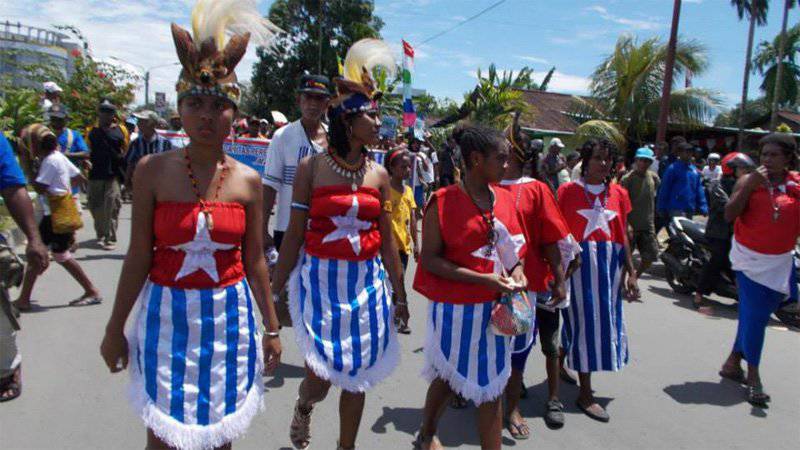
In 1982, the Revolutionary Council of the Free Papua Movement was created, the goal of which was to organize an international campaign of solidarity with the Papuan people, capable of gaining recognition for the independence of Papua by Western countries. In 1984, the ORM partisans attacked the city of Jayapura, the capital of the province of Irian Jaya, but the Indonesian troops managed to relatively quickly repel the attacks of the rebels, using obvious strength and technical superiority. This attack was used by the Indonesian military command to intensify anti-insurgency activities on the island. The fight against the partisans took on the character of the extermination of the indigenous population, as a result of which a mass flight of residents of “wiped out” villages across the border into Papua - New Guinea began.
14 February 1986. Freeport was again notified of upcoming ORM protest rallies. Following the letters, several of the company's slurry and fuel pipelines were damaged. The result was substantial losses incurred as a result of the loss of the slurry and the diesel fuel. Simultaneously, the partisans set fire to the fuel line and fired at the police officers who arrived at the scene. 14 April 1986. ORM's action repeated - this time also the pipelines and electrical cables were damaged, equipment was burned. The guerrillas fired repair crews trying to get closer to the company. In January and August 1996, ORM fighters captured Indonesian and European specialists who worked on a rotational basis at mining company facilities. Two hostages were killed, the rest were released.
In July, the flag of West Papua was hoisted by partisans on Kota Biak water tower (Biak Island) by partisans. Next to the flag for several days was a rebel group, which was eventually arrested by the Indonesian military authorities. Among those detained during this action was the legendary leader of the national liberation movement Filep Karma.
Currently Filep Jacob Samuel Karma (born 15 August 1959) is considered one of the most famous Papuan figures of the national liberation movement. He was born in the family of a colonial civil servant Andreas Karma, who served in the Dutch administration. Origin helped Filep Carme to get an education - he studied in Java, then - at the Asian Institute of Management in Manila (Philippines). Filep Karma has two children. 2 July 1998, he led a demonstration of raising the flag in Biak, was wounded in both legs with rubber bullets. The court sentenced Karma to six and a half years in prison for high treason, but after ten months in prison, the sentence was quashed.
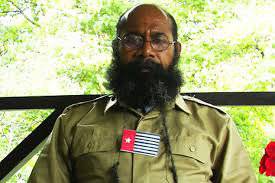 1 December 2004, he raised the flag of the morning star (the national Papuan flag) at a ceremony in Jayapura, after which he was arrested and sentenced on high treason charges to fifteen years in prison. Amnesty International has added Filep Karma to the list of political prisoners - prisoners of conscience. The flag of the morning star is considered the national symbol of West Papua. It has been used since the days of the Netherlands administration of Western New Guinea in the 1949-1962 years. It was first raised on December 1 1961 of the year, raised with the flag of the Netherlands and was canceled after the inclusion of West Irian in Indonesia in 1962 year. Since then, the flag has been actively used by the Free Papua Movement and other Papuan national-liberation organizations. It is a red vertical stripe with a white five-pointed star in the center and a white cloth with blue transverse stripes. Only one public demonstration of this flag in modern Indonesia can be “grabbed” several years of imprisonment on charges of high treason.
1 December 2004, he raised the flag of the morning star (the national Papuan flag) at a ceremony in Jayapura, after which he was arrested and sentenced on high treason charges to fifteen years in prison. Amnesty International has added Filep Karma to the list of political prisoners - prisoners of conscience. The flag of the morning star is considered the national symbol of West Papua. It has been used since the days of the Netherlands administration of Western New Guinea in the 1949-1962 years. It was first raised on December 1 1961 of the year, raised with the flag of the Netherlands and was canceled after the inclusion of West Irian in Indonesia in 1962 year. Since then, the flag has been actively used by the Free Papua Movement and other Papuan national-liberation organizations. It is a red vertical stripe with a white five-pointed star in the center and a white cloth with blue transverse stripes. Only one public demonstration of this flag in modern Indonesia can be “grabbed” several years of imprisonment on charges of high treason. Despite the past decades and the change in the political regime in Indonesia itself, the government has not been able to reach an agreement with the fighters for the independence of West Papua. A sluggish civil war continues in the two provinces into which West Irian has been divided since 2003. For almost half a century of resistance to the Indonesian occupation of the island, according to the Free Papua Movement, about 500 Papuans were killed by government forces. International estimates are more modest - about 100 thousand killed Papuans and Melanesians. Most of them are civilians who have become victims aviation strikes on guerrilla-backed villages; and Indonesian security forces 'cleansing' of villages. That is, on the territory of West Irian, a real genocide of the indigenous population is taking place, which is not paid attention to by Western governments and most international organizations. On the other hand, the Indonesian leadership is trying to keep secrecy about what is happening in the provinces of Papua and West Papua, as it fears international publicity of the Indonesian administration's war crimes. Foreign journalists and, in general, foreign citizens are extremely reluctant to enter the region.
In response, the Papuan guerrillas themselves also do not stop active armed resistance to the Indonesian government. 24 October 2011 Police Chief Mulia was shot dead at the airport by Free Papua Movement militants. 8 January 2012. Partisans attacked a bus carrying Indonesian civilians and military personnel, killing 1 by an Indonesian police officer and three civilians. 21 January 2012. ORM members killed a migrant from West Sumatra, thereby confirming their course to counter Indonesian populations of Western New Guinea. 8 April 2012 by ORM militants attacked a plane at Mulia Airport. Five militants opened fire on the landing plane, as a result of which one civilian was killed, both pilots, a passenger and her child were injured. 9 July 2012 a policeman and two Indonesians were killed. Similar reports come from the provinces of Papua and West Papua almost every month.
At present, ORM remains an amorphous rather than a centralized organization. Its internal structure is poorly understood even by the Indonesian counterintelligence agents themselves and the police. It is known that in 1996 the supreme commander of the ORM was Matthias Wenda, under whose leadership there were about nine semi-autonomous armed units. Throughout the history of ORM, there have been contradictions between individual field commanders who vie for leadership of the movement as a whole. So, Seth Roemkorem was the commander of the ORM and the president of the Provisional Government of West Papua, Jacob Pry - head of the Senate of West Papua. After Seth Roemkorem left for the Netherlands, Jacob Pry took over the leadership of ORM. He created a board of nine commanders, detachments of which were based primarily on the border of West Papua.
Benny wenda and his fight
Among the most famous figures of the Papuan national liberation movement, personifying the struggle for the Free Papua in the West, should be called, first of all, Benny Wenda. He is a relatively young man. Born in 1975 in the Baliem Valley in the central mountainous region of West Papua. When Venda was two years old, in 1977, an uprising of the 15 of a thousandth deer tribe against the Indonesian military presence took place. The command of the Indonesian troops responded by bombing the doe villages. Many relatives of Venda were killed, the leg of a two-year-old boy was injured. 1977 to 1983 Benny Wenda and his family hid, like thousands of other members of the tribe, in the jungle. After the doe's tribe capitulated, Benny went to study at the university in Jayapura, where he received a sociological education.
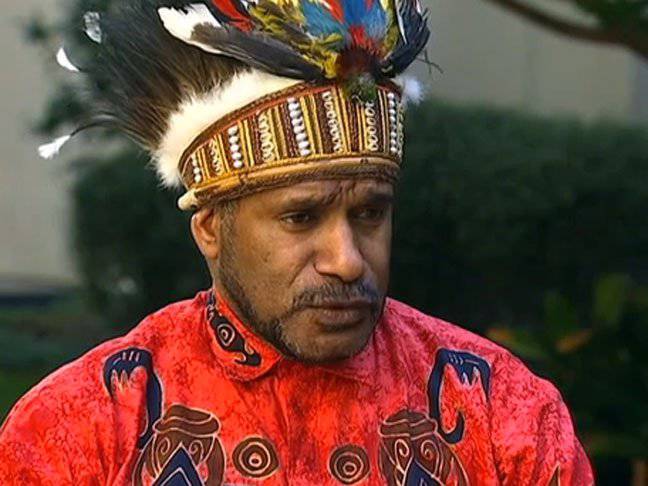
Benny Wenda was elected the elder of the tribe, at the same time expanding active political activities in the direction of the struggle for self-determination of the people of West Papua. He was elected General Secretary of the Tribal Assembly, created to preserve the customs and traditions of the tribes of West Papua and uniting the elders of the mountain tribal groups. The Tribal Assembly advocated full political independence from Indonesia and rejected any autonomy options offered by the Indonesian government. In 2002, Mr. Benny Wenda was convicted for organizing a demonstration in support of independence, which turned into a riot. During the unrest, the Papuans killed a policeman and burned two stores. The arrest was used by Benny Wenda to accuse the Indonesian authorities of political repression against the Papuan national liberation movement. At the same time, Benny was threatened with offenses for up to 25 years in prison. However, the Papuan leader managed to escape from prison. With the help of activists, he was taken to Papua New Guinea, where he and his spouse Maria Venda were soon taken. Somewhat later, with the help of a European human rights organization, Venda was granted political asylum in the UK.
In the meantime, the Indonesian government decided to arrest Venda with Interpol. For this, he was entered in the register of wanted criminals. However, after a trial of international character, Interpol removed Venda from the list of criminals in 2012, concluding that the Indonesian authorities were politically involved in his case. Since then, Venda has been legally active in the UK, working with activists who are sympathetic to the Papuan national liberation movement at Oxford University. The solidarity movement with West Papua in the UK brings together student groups in British universities. There are representative offices of the movement in Oxford, The Hague and Port Moresby (the capital of Papua - New Guinea).
In 2013, Mr. Benny Wenda made a trip to the United States, Australia, New Zealand, Papua New Guinea and Vanuatu, setting himself the task of familiarizing the public in these countries with the problems of West Papua and the objectives of the national liberation movement. In April, 2013 opened the headquarters of the Free West Papua to Oxford, which caused a negative reaction from the Indonesian Foreign Ministry, which triggered the UK ambassador for the proceedings and explanations. In May, 2013 Venda spoke to 2,5 by thousands of listeners at the Sydney Opera House, which also led to claims by the Indonesian leadership - this time to the Australian authorities who allowed the event to be held in Sydney. In addition to active political activities, Benny Wenda and his wife Maria are world-famous performers of traditional Western Papua music. In 2008, they released the album “Songs of Freedom” (Ninalik Ndawi).
West Papua National Committee
In addition to the Papua Free Movement (ORM), in the provinces of Papua and West Papua, as well as among Papuan students in other regions of Indonesia, the National Committee of West Papua (KNPB) operates. This organization was created on November 19 of 2008 in Jayapura, to organize a referendum on the Papuan and Melanesian peoples on the realization of the right to self-determination of the provinces of Papua and West Papua. Initially, the organization followed exclusively non-violent methods. However, in April 2009, at a 15-thousand demonstration organized by the committee, eight demonstrators were killed by Indonesian police.
In response, the committee called on Papuan students studying at universities in Java, Bali, Makassar and Manado to return to Papua. Hundreds of young people responded to the committee’s proposal, but many of them were arrested upon returning to their home province. In 2010, the committee organized new demonstrations, accompanied by clashes with the police and security forces. The committee currently has offices in Jakarta, Manado, as well as outside Indonesia. In 2010, Bukhtar Tabuni was elected chairman of the committee, Viktor Djeimo was elected international press secretary. Soon, both of them were arrested and sentenced to three years in prison each for incitement to violate the state security of Indonesia. Deputy Committee Chairman Mako Tabuni 14 June 2012 was killed by a group of police officers. Victor Jaymo replaced Bukhtar Tabuni as chairman of the committee, but almost immediately fled from the territory of West Irian, fleeing from police repression.
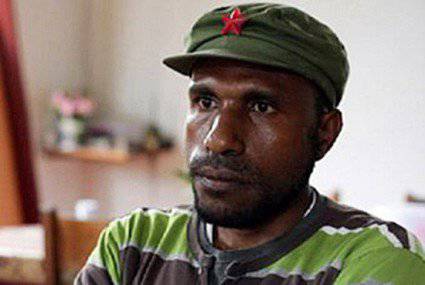 Born in 1983, Victor Jaymo, he was a prominent activist of the Papuan national liberation movement for a long time, until he was elected General Secretary of the National Committee of West Papua, which he currently holds. 21 October 2009. He was arrested at a hotel in Abepur and charged with treason. 23 July 2010. Mr. Jameo was convicted of incitement to violate state security. 1 December 2012, on the day of the first raising of the national flag of the Papuans, the National Committee tried to hold a demonstration, dispersed by the police. 13 May 2013 Mr. Jaymo was arrested again during a march in Jayapura.
Born in 1983, Victor Jaymo, he was a prominent activist of the Papuan national liberation movement for a long time, until he was elected General Secretary of the National Committee of West Papua, which he currently holds. 21 October 2009. He was arrested at a hotel in Abepur and charged with treason. 23 July 2010. Mr. Jameo was convicted of incitement to violate state security. 1 December 2012, on the day of the first raising of the national flag of the Papuans, the National Committee tried to hold a demonstration, dispersed by the police. 13 May 2013 Mr. Jaymo was arrested again during a march in Jayapura. The problem of West Papua’s self-determination is unlikely to be resolved in the foreseeable future. Indonesia and the transnational corporations behind it will never allow the region, so rich in forests and minerals, to be “conserved” and “closed” for foreign companies as the independence fighters desire. Therefore, we can expect further continuation of the armed confrontation between government forces and insurgents, attempts by Papuan public organizations to draw world attention to the problem of Western New Guinea. On the other hand, the nature features of Western New Guinea are becoming a serious obstacle for the Indonesian government forces. Up to 75% of the provinces of Papua and West Papua are covered with dense forests, a significant part are mountains. This makes it very difficult to move military and police units. At the same time, the disunity of the Papuan and Melanesian population into hundreds of ethnic groups and tribes entails obvious difficulties in forming a single national liberation movement with centralized leadership.
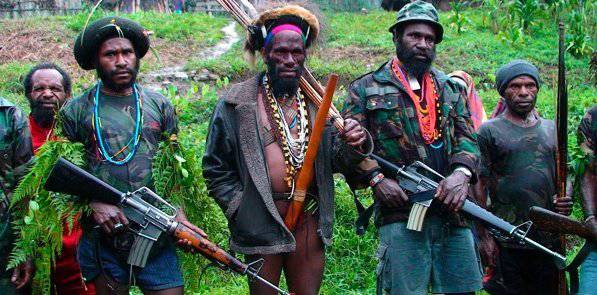
Information